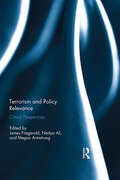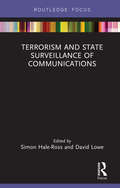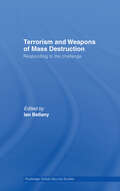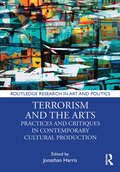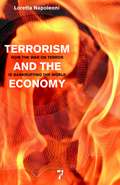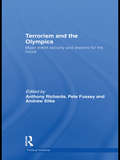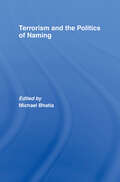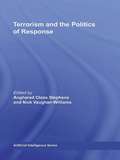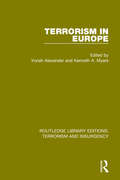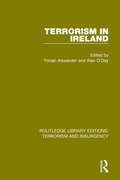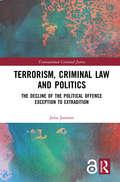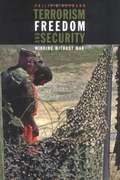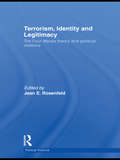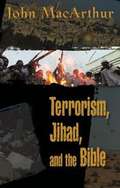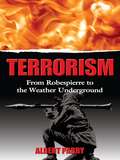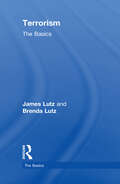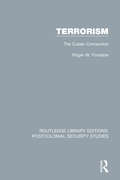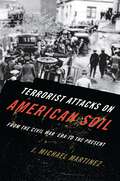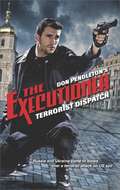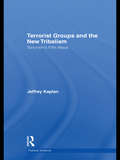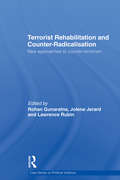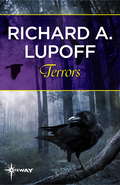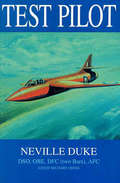- Table View
- List View
Terrorism and Policy Relevance: Critical Perspectives
by Megan Armstrong James Fitzgerald Nadya AliThis book explores the interrelationship between terrorism and policy relevance from a range of critical perspectives. In particular, it questions the politics of policy-relevance; that is, it interrogates how epistemological and practical pressures to produce "policy-relevant" research shapes prevalent understandings of (counter)terrorism, and vice-versa. It also reflects on Critical Terrorism Studies’ (CTS) relationship to policy-relevance. Should CTS eschew engagement with policy-relevance and maintain a position outside the orthodoxy, or are CTS scholars uniquely positioned to offer meaningful alternatives to contemporary counterterrorism practices? Read thus, the question of policy relevance is central to CTS’ identity and represents an essential juncture as to how associated scholarship might develop into the future.
Terrorism and State Surveillance of Communications
by David Lowe Simon Hale-RossThis book brings together leading counterterrorism experts, from academia and practice, to form an interdisciplinary assessment of the terrorist threat facing the United Kingdom and the European Union, focusing on how terrorists and terrorist organisations communicate in the digital age. Perspectives drawn from criminological, legalistic, and political sciences, allow the book to highlight the problems faced by the state and law enforcement agencies in monitoring, accessing, and gathering intelligence from the terrorist use of electronic communications, and how such powers are used proportionately and balanced with human rights law. The book will be a valuable resource for scholars and students of terrorism and security, policing and human rights. With contributions from the fields of both academia and practice, it will also be of interest to professionals and practitioners working in the areas of criminal law, human rights and terrorism.
Terrorism and Weapons of Mass Destruction: Responding to the Challenge (Routledge Global Security Studies)
by Ian BellanyThere is a widely held belief in the imminent probability of nuclear, chemical, or biological weapons of mass destruction being used by terrorists against civilian targets. This edited volume critically assesses the suggestion that one safeguard against this possibility would be to strengthen existing international prohibitions against state- level acquisition of such weapons. A glimpse of the possible potential of terrorist use of weapons of mass destruction has been seen through the actions of the Tokyo Aum group, and through the use of chlorine by insurgents in Iraq. However, the extent of the real threat posed is as yet unclear, and safeguarding against it in developing countries will not be easy. This book assembles specialists in each category of WMD in order to examine the potential of expanding the three ‘classical’ arms control treaties in order to combat the threat posed by smaller terrorist groups, and draws conclusions as to the strengths and weaknesses of this suggestion.
Terrorism and the Arts: Practices and Critiques in Contemporary Cultural Production (Routledge Research in Art and Politics)
by Jonathan HarrisThis book assesses the key definitions, forms, contexts and impacts of terrorist activity on the arts in the modern era, using historical and contemporary perspectives. Its empirical case studies include theatre, literature, music, visual art, mass media, film and the mores of ‘ordinary life.’ While its immediate reflective context is Islamic fundamentalist terrorism, the book reviews a broader range of definitions and counter-definitions of 'terrorism', 'state terrorism' and 'states of terror,' examining uses of the terms through a series of comparative analyses. Chapters focus on the intersection of these definitional questions with heuristic analysis of art forms, cultural activities and their socio-historical contexts. This book will be of interest to scholars in art history, terrorism, politics and the media, and visual culture.
Terrorism and the Economy: How the War on Terror is Bankrupting the World
by Loretta NapoleoniEconomist and best-selling author Loretta Napoleoni traces the link between the finances of the war on terror and the global economic crisis, finding connections from Dubai to London to Las Vegas that politicians and the media have at best ignored. In launching military and propaganda wars in the Middle East, America overlooked the war of economic independence waged by Al-Qaeda. The Patriot Act boosted the black market economy, and the war on terror prompted a rise in oil prices that led to food riots and distracted governments from the trillion-dollar machinations of Wall Street. Consumers and taxpayers, spurred by propaganda fears, were lured into crushing global debt. Napoleoni shows that if we do not face up to the many serious connections between our response to 9/11 and the financial crisis, we will never work our way out of the looming global recession that now threatens our way of life.While we feared that Al-Qaeda might destroy our world, Wall Street ripped it apart.
Terrorism and the Olympics: Major Event Security and Lessons for the Future (Political Violence)
by Anthony RichardsThe book aims to outline the progress, problems and challenges of delivering a safe and secure Olympics in the context of the contemporary serious and enduring terrorist threat. The enormous media profile and symbolic significance of the Olympic Games, the history of terrorists aiming to use such high-profile events to advance their cause, and Al Qaeda's aim to cause mass casualties, all have major implications for the security of London 2012. Drawing on contributions from leading academics and practitioners in the field the book will assess the current terrorist threat, particularly focusing on terrorist targeting and how the Olympics might feature in this, before addressing particular response themes such as transport security, the role of surveillance, resilient designing of Olympic sites, the role of private security, and the challenge of inter-agency coordination. The book will conclude by providing an assessment of the legacy of Olympic security to date and will discuss the anticipated issues and dilemmas of the future. This book will be of interest to students of terrorism studies, security studies, counter-terrorism and sports studies.
Terrorism and the Politics of Naming (ISSN)
by Michael BhatiaPreviously published as a special issue of Third World Quarterly, this volume assesses the nature, power, role and function of names in global politics and the international media.Names are not objective, they accrue subjective associations, for example 'Terrorist' has a very different connotation to 'Freedom-fighter'. The contributors seek the truth beneath the names assigned in an effort to remove the obscurity created by the power of 'the politics of naming' to the reality of the situation, taking examples from Al Qaeda, Russia's demonization of the Chechens and naming in the Israeli-Palestine conflict, among other important contemporary debates. Terrorism and the Politics of Naming makes a substantial contribution towards elucidating the power of naming in the discourse of conflict and will be of great interest to students and scholars of political philosophy, political theory, and politics and the media.
Terrorism and the Politics of Response (Routledge Critical Terrorism Studies)
by Nick Vaughan-Williams Angharad Closs StephensThis inter-disciplinary edited volume critically examines the dynamics of the War on Terror, focusing on the theme of the politics of response. The book explores both how responses to terrorism - by politicians, authorities and the media - legitimise particular forms of sovereign politics, and how terrorism can be understood as a response to global inequalities, colonial and imperial legacies, and the dominant idioms of modern politics. The investigation is made against the backdrop of the 7 July 2005 bombings in London and their aftermath, which have gone largely unexamined in the academic literature to date. The case offers a provocative site for analysing the diverse logics implicated in the broader context of the War on Terror, for examining how terrorist events are framed, and how such framings serve to legitimise particular policies and political practices.
Terrorism in Europe (Routledge Library Editions: Terrorism and Insurgency)
by Yonah Alexander Kenneth MyersThis study places terrorist acts in Europe in their historical perspective by examining terrorist and anarchist movements in late nineteenth century Europe. The political and legal aspects of modern terrorism are discussed in detail and the themes and variation in political terrorism are examined fully. In addition, selected case studies of contemporary terrorist movements are considered in the context of the political tradition of the particular country. A comprehensive picture of European terrorism, in its historical and more contemporary ideological and political aspects emerges from this work.
Terrorism in Ireland (Routledge Library Editions: Terrorism and Insurgency)
by Yonah Alexander Alan O'DayWhen originally published in 1984, this book was the first detailed study of terrorism in Ireland. It assesses the situation in Ireland after a decade or more of violence in the North and tests some of the assumptions about the nature of terrorism and discusses the problem in a geo-political context. The authors reflect a variety of disciplines and political outlooks and no single line of argument is offered. They examine how the issue of terrorism has been dealt with by various governments, the church, the media and individuals. The book reveals the complexity of the terrorist problem and dispels some of the myths that have grown up around Irish terrorism.
Terrorism, Criminal Law and Politics: The Decline of the Political Offence Exception to Extradition (Transnational Criminal Justice)
by Julia JanssonRecent atrocities have ensured that terrorism and how to deal with terrorists legally and politically has been the subject of much discussion and debate on the international stage. This book presents a study of changes in the legal treatment of those perpetrating crimes of a political character over several decades. It most centrally deals with the political offence exception and how it has changed. The book looks at this change from an international perspective with a particular focus on the United States. Interdisciplinary in approach, it examines the fields of terrorism and political crime from legal, political science and criminological perspectives. It will be of interest to a broad range of academics and researchers, as well as to policymakers involved in creating new anti-terrorist policies.
Terrorism, Freedom, and Security: Winning without War
by Philip B. HeymanA former Deputy Attorney General of the United States argues that we must preserve our civil liberties and democratic values while fighting terrorism.
Terrorism, Identity and Legitimacy: The Four Waves theory and political violence (Political Violence)
by Jean E. RosenfeldThis book argues that terrorism in the modern world has occurred in four "waves" of forty years each. It offers evidence-based explanations of terrorism, national identity, and political legitimacy by leading scholars from various disciplines with contrasting perspectives on political violence. Whether violence is local or global, it tends to be both patterned and innovative. It elicits chaos, but can be understood by the application of new models or theories, depending upon the methods and data experts employ. The contributors in this volume apply their experiences and studies of terrorists, mob violence, fashions in international and political violence, religion’s role in terrorism and violence, the relationship between technology and terror, a recurring paradigm of terrorist waves, nation-states struggling to establish democratic/elective governments, and factions competing for control within states - in order to make sense of both national and international acts of political violence and to ask and answer some of the most disturbing questions these phenomena present. This book will be of much interest to students of terrorism, religion and violence, nationalism, sociology, war and conflict studies and IR in general.
Terrorism, Jihad, and the Bible: A Response to the Terrorist Attacks
by John MacarthurSeptember 11, 2001 saw the deadliest attack ever launched on American soil, leaving us asking questions such as: Why did God permit such a thing to happen? Was the attack a divine judgment or was it merely an atrocity perpetrated by the forces of evil? How can human beings be capable of such diabolical savagery in the name of religion? And what is the right course of action for our government to take? John MacArthur points us to the Bible for answers to these and many other questions arising out the recent atrocities. He educates readers to the roots of the conflict, linking the religious and political issues that underlie the current turmoil to the Old Testament.
Terrorism: From Robespierre to the Weather Underground
by Albert Parry"A very impressive and comprehensive story on terrorism . . . enormously valuable."--Brian Crozier, former director of the Institute for the Study of Conflict, LondonA compulsively readable analysis of modern terrorism, this brilliant, vital work by a noted expert on terrorism and guerrilla warfare describes the nature of terrorist organizations and events and analyzes the changing nature and evolution of unconventional political warfare. From the genesis of the Great Terror initiated by Robespierre over 200 years ago, to the Black Panthers, the Symbionese Liberation Army, and the mass terrorism of Stalin, Hitler, and Mao, this absorbing work offers unsurpassed insight into seemingly irrational acts of violence and murder. The author, who was born in Russia and as a youth only narrowly escaped being a victim of terrorism, does a superb job of helping readers to understand the causes and nature of terrorism, and how terrorists use intimidation, violence, and bloodshed to threaten the stability of society.
Terrorism: The Basics (The Basics)
by James Lutz Brenda J LutzTerrorism: The Basics is an ideal starting point for anyone interested in one of the most discussed, written about and analysed aspects of modern life. Common misconceptions are dispelled as the authors provide clear and jargon-free answers to the big questions: What does terrorism involve? Who can be classified as a terrorist? What are terrorists trying to achieve? Who are the supporters of terrorism? Can there ever be an end to terrorist activity? These questions and more are answered with reference to contemporary groups and situations allowing readers to relate theory to what they have seen on the news. Written with clarity and insight, this book is the perfect first book on terrorism for students of all levels.
Terrorism: The Basics (The Basics)
by Brenda Lutz James LutzTerrorism: The Basics is an ideal starting point for anyone interested in one of the most discussed, written about and analysed aspects of modern life. Common misconceptions are dispelled as the authors provide clear and jargon-free answers to the big questions: What does terrorism involve? Who can be classified as a terrorist? What are terrorists trying to achieve? Who are the supporters of terrorism? Can there ever be an end to terrorist activity? These questions and more are answered with reference to contemporary groups and situations allowing readers to relate theory to what they have seen on the news. Written with clarity and insight, this book is the perfect first book on terrorism for students of all levels.
Terrorism: The Cuban Connection
by Roger W. FontaineFirst published in 1988, Terrorism: The Cuban Connection examines Cuba’s involvement in terrorism. With a focus on Havana, the book begins by looking at Cuba’s history and the origins of terrorism. As it progresses, the book traces the development of terrorism and explores Cuba’s connections with other parts of the world, including America, Russia, the Caribbean, South America, the Middle East, and Sub-Saharan Africa. Terrorism: The Cuban Connection is a detailed study, equipped with a wealth of key documents and photographs.
Terrorist Attacks on American Soil: From the Civil War Era to the Present
by J. Michael MartinezUnderstanding the context of terrorism requires a trek through history, in this case the history of terrorist activity in the United States since the Civil War. Because the topic is large and complex, Terrorists Attacks on American Soil: From the Civil War to the Present does not claim to be an exhaustive history of terrorism or the definitive account of how and why terrorists do what they do. Instead, this book takes a representative sampling of the most horrific terrorist attacks on U.S. soil in an effort to understand the context in which they occurred and the lessons that can be learned from these events.
Terrorist Dispatch
by Don PendletonCRIMEAN DEADLOCK Ukrainian militants are the initial suspects in a terrorist attack on Washington, DC, until rumors surface suggesting Moscow was behind the bombing. But the investigation only raises more questions. Was the attack an attempt to mute US criticism of Russia, or a call to action to help suppress Ukrainian dissidents? Only one man can solve the riddle and mete out appropriate punishment: Mack Bolan. From Manhattan's Little Ukraine to the war-torn country itself, Bolan blazes a path of truth and justice to neutralize the threat...and prevent another slaughter on American soil even as the danger increases with enemies and allies emerging on both sides of the Crimean conflict. But the Executioner is no middleman; he has his own war to fight, and he won't stop until his opponents are ashes.
Terrorist Groups and the New Tribalism: Terrorism’s Fifth Wave (Political Violence)
by Jeffrey KaplanThe central focus of this book is a small but vitally important group of movements that constitute a distinct 'fifth wave' of modern terrorism, here called the "New Tribalism". Terrorist Groups and the New Tribalism examines a collection of terrorist or insurgent movements whose similarity in tactics, strategic vision and desire to radically reshape their worlds to conform with a ‘Golden Age’ dream of perfection which is to be achieved through a genocidal or ethnic cleansing process to make way for the emergence of a new, radically perfected tribal utopia in a single generation. These shared strategic and tactical factors allow them to be examined through a comparative lens as a distinct ‘fifth wave’ of modern terrorism. Structured around the theoretical framework of David Rapoport’s Four Waves thesis, the book examines anomalous movements that began within a distinct wave of international terrorism, but, following a crisis model, has turned inwards toward radical localism, tribalism and xenophobia. The text is divided between theory and in depth case studies of the Ugandan Lord’s Resistance Army and the Sudanese Janjaweed. It concludes with a design for further, field-work based research. This book will be of interest to students of Terrorism and Political Violence, Genocide, Conflict Studies, African politics and Political Science in general. Jeffrey Kaplan is an Associate Professor of Religion and the Director of the Institute for the Study of Religion, Violence and Memory at the University of Wisconsin Oshkosh. He is the author of 11 books on terrorism and political violence.
Terrorist Rehabilitation and Counter-Radicalisation: New Approaches to Counter-terrorism (Political Violence)
by Rohan Gunaratna Lawrence Rubin Jolene JerardThis book seeks to explore the new frontiers in counter-terrorism research, analyses and practice, focusing on the imperative to rehabilitate terrorists. The post-9/11 world is in a very early stage of global rehabilitation both of terrorists and criminals. Nonetheless, some correctional rehabilitation programs have led convicted and suspected terrorists to express remorse, repent, and recant their violent ideologies and re-enter mainstream politics, religion and society. Although operational counter-terrorism initiatives have received both investment and attention, strategic counter-terrorism initiatives that ultimately end violence including terrorism but require patience and sustained efforts have been neglected by governments and received inadequate public coverage. This book is an early attempt to examine a few case studies both by practitioners and scholars. This book provides a better understanding of the process of deradicalization, and will be the first step towards exploring the development of tools necessary to examine and address challenges faced by practitioners. This book will be of much interest to students of terrorism and political violence, radical Islam, conflict resolution, war and conflict studies and IR/Security Studies.
Terrors
by Richard A. LupoffRanging from the mysterious to pulp action to the Lovecraftian, this vivid collection of short fiction explores a world of radio heroes, masterful villains, and creatures from places unknown.
Terrors
by Richard A. LupoffRanging from the mysterious to pulp action to the Lovecraftian, this vivid collection of short fiction explores a world of radio heroes, masterful villains, and creatures from places unknown.
Test Pilot
by Neville DukeThe renowned WWII RAF fighter pilot who went on to set an air speed record tells his story—now with an updated chapter and new photos. Joining the RAF at the beginning of the war, young Neville Duke became a fighter pilot with the crack 92 Squadron at RAF Biggin Hill in 1941. That spring and summer, he survived the air battles over Northern France with the Biggin Hill Wing, often flying as wingman to the legendary Adolph &“Sailor&” Malan, Fighter Command&’s top-scoring pilot at that time. Duke quickly established himself as one of the most successful pilots in North Africa, bringing his score to twenty-one by the end of the Tunisian Campaign, and then took command of 145 Spitfire Squadron in Italy. Leading this unit in the summer of 1944, he brought his score to twenty-eight. Earning numerous honors, he was recognized for his heroism, but the military was only the beginning of his life in aviation. Toward the end of the war, he became an RAF test pilot—and later a member of the RAF High Speed Flight. He would go on to a successful postwar career, playing a key role in the flight development on one of the most famous of all RAF peacetime aircraft—the Hawker Hunter—and taking the world speed record in 1953. An in-depth look at his daring exploits covering both his combat career and his postwar accomplishments, Test Pilot is now updated with an additional chapter, appendices and index, and a completely new selection of photographs.
